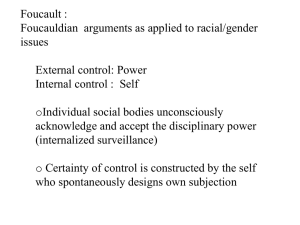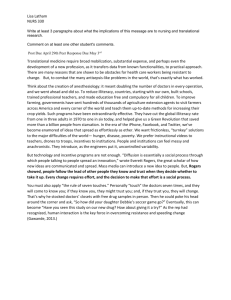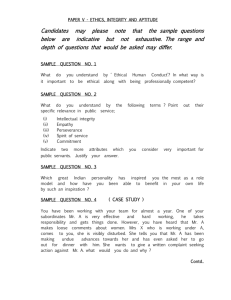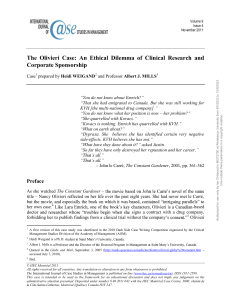Learning How Not to Do the Pharmaceutical Tango
advertisement
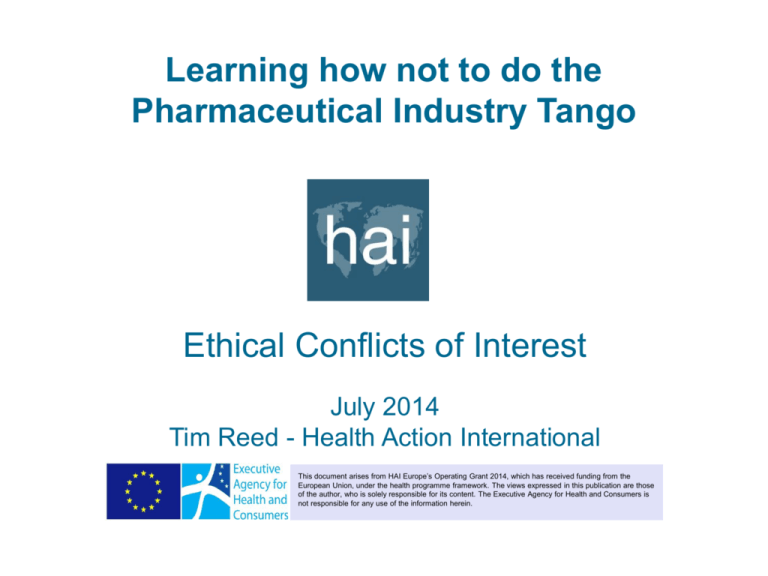
Learning how not to do the Pharmaceutical Industry Tango Ethical Conflicts of Interest July 2014 Tim Reed - Health Action International This document arises from HAI Europe’s Operating Grant 2014, which has received funding from the European Union, under the health programme framework. The views expressed in this publication are those of the author, who is solely responsible for its content. The Executive Agency for Health and Consumers is not responsible for any use of the information herein. Acknowledgements: • Arthur Schafer, HAI Member, Author Chap 6 • Nancy Olivieri, HAI Member, Author Chap 6 Financial disclosure: • No pharmaceutical or advertising industry funding • Funding for my position: DFID, UK; DG Sanco, EU Outline: • • • • • • • • • Gifts No such thing as a free lunch… I can’t be bought… Peer to Peer Marketing Continuing Medical Education Funding of Research The ‘Olivieri Case’ Conflicts of Interest Key Principles of Conflict of interest The Impact of Gifts • Contact and the potential for gifts starts early • Pre-clinical to clinical setting (33% - 72% over 20 exposures) • Sponsored events, gifts, free meals, samples, pizza, beer, textbooks, pocket texts • Range from a pen to $800 travel bursary • Small gifts are highly prized by students The Impact of Gifts • Students = once a week (2005) • 70% felt that it didn’t affect them • The more they receive, the less they claim their behaviours affected (dissonance & consonance) • Gifts DO influence behaviour • ‘Gift Economy’; expectation that lasts a lifetime in practice The Impact of Gifts • Free Samples – Market Seeding • "I don't criticise the marketers for behaving like marketers. What they do is make people feel entitled - so it's not a bribe; it's their due. And you end up with a situation where doctors won't walk fifty yards at a big medical meeting without being transported in a drug company bus." Free Lunch • Colleges may ‘require’ students to attend sponsored lunches • Lunches on the ward are common • Business class travel to luxurious resorts • Consultancy and speakers fees add substantially to a doctors income • If banned by codes of practice, faculties are given unrestricted grants … who than buy the meals • Competition between companies I can’t be bought… • Students are poor and believe they can’t be bought • Doctors will not (I hope) consciously prescribe irrationally • Most students and practitioners believe they are not affected • "even when individuals try to be objective, their judgements are subject to an unconscious and unintentional self-serving bias." I can’t be bought… • ".few doctors accept that they themselves have been corrupted. Most doctors believe that they are quite untouched by the seductive ways of industry marketing men [and women]; that they are uninfluenced by the promotional propaganda they receive; that they can enjoy a company's 'generosity' in the form of gifts and hospitality without prescribing its products. The degree to which the profession, mainly composed of honourable and decent people, can practice such self deceit is quite extraordinary. No drug company gives away its shareholders' money in an act of disinterested generosity." Mike Rawlins NICE Peer to Peer Marketing • Doctors respond well to each other • During the gabapentin case it emerged that Parke-Davis identified 40 potential 'thought leaders' in one US region, more than half of whom were current or future university departmental chairs, vice-chairs or directors of academic clinical programmes. Thirty-five of these 40 'thought leaders' participated in ParkeDavis-sponsored activities, and 14 of them received honoraria, research grants or educational grants from the company (US$10,000 to $158, 250 per 'thought leader') Continuing Medical Education (CME) • Condition of keeping licence to practice • Over 60% of CME in the US is paid for by pharmaceutical or device industry • 2006; USD1.45 Billion on accredited CME • Do the public know? Industry funding predict research results? • Research Funding • Sponsor involved in the design and analysis of clinical trials • Sponsor involved in the reporting of results • Stelfox and colleagues: – What is the association between funding and results – ‘Supportive’; ‘Critical’; ‘Neutral’ Ninety-six per cent of supportive authors had financial relationships with the manufacturers of calcium channel antagonists, as compared with 60 per cent of the neutral authors and 37 per cent of the critical authors Funding and Research Results • Studies funded by the industry four times as likely to report favourable results than non-industry funded studies Sponsorship … creates subtle influences through the building of relationships that lead researchers to see the pharmaceutical companies with which they interact, and their products, in a more favourable light than they would otherwise.” Funding and Research Results • Ghost writing – someone who has authored a paper, but is not listed in the list of authors • Guest Author – has not contributed but lends weight and credibility to the paper • Zoloft trial reports with ‘authors to be to be determined’ (2007) • Contract medical writing company responsible for management of 85 papers on Pfizer's antidepressant, sertraline (Zoloft), • • 55 resulted in published reports (Healy and Cattell, 2003) all included clinical trials and economic analyses favourable to Pfizer. Olivieri Case • Academic freedom and integrity of the scientific literature on the safety and effectiveness of medicines. • In 1995, Nancy Olivieri was the lead researcher in a study of a new medicine for thalassemia, a hereditary form of anaemia. • Deferiprone was the first oral treatment for thalassemia, an important potential advance over subcutaneous infusions. The trial was carried out at a University of Toronto teaching hospital where Dr Olivieri was a clinical faculty member. The sponsor was a Canadian pharmaceutical company, Apotex. Olivieri Case • During the trial, Dr Olivieri and a colleague became concerned about risks from iron accumulation in the livers of some patients on deferiprone. They wanted to carry out more monitoring and to warn patients of this potential risk. Apotex officials disagreed with their concerns • Apotex officials disagreed with their concerns, threatened legal action, stopped the trial and removed Dr Olivieri from a second deferiprone safety trial in Europe. Olivieri Case • Neither the university nor the hospital supported Dr Olivieri against Apotex. She was initially removed from her clinical faculty position, but was later reinstated after an independent inquiry found no evidence of wrongdoing. • In 2002, she and her colleagues reached a mediated settlement with the hospital and university, providing them with substantial redress for grievances over unfair treatment. A settlement against Apotex remains in dispute, more than ten years later. Olivieri Case The issue is not about whether their inconvenient findings were correct. It is about individual conscience in conflict with corporate greed. It is about the elementary right of doctors to express unbought medical opinions and their duty to acquaint patients with the risk they believe to be inherent in the treatments they prescribe.” John Le Carre, The Constant Gardener, 2001 Conflicts of Interest • Doctors dilemma – House and Home/commitment to service of others • Patients trust doctors and pharmacists • When healthcare professionals accept any inducement, however small, they are in a conflict of interest "A person is in a conflict of interest situation if s/he is in a relationship with another in which she has a moral obligation to exercise her judgement in that other's service and, at the same time, s/he has an interest tending to interfere with the proper exercise of judgement in that relationship." (Davis, 1982). Conflicts of interest • Gifts create a sense of obligation, often unconscious, to 'return the favour' - reciprocity • Doctor may hope to receive future gifts, perhaps fairly substantial ones, from this company or from other pharmaceutical companies, self-interest reinforces the principle of reciprocity • If doctors understood this clearly, they would never permit themselves to compromise the integrity of their judgement. • If patients understood this clearly, they would not tolerate a physician or their pharmacist beholden to the pharmaceutical industry. Key Principles of Conflicts of Interest • 1. Respect for autonomy requires that patients should be encouraged and assisted, whenever possible, to make informed and voluntary decisions about their health care. It is the basis for informed consent in interactions between health professionals and patients. • 2. Nonmaleficence - to do no harm. Doctors should strive not to cause needless harm or injury to the patient, either through the treatment that is provided or by not providing needed care. • 3. Beneficence: Health-care providers have a duty of care to benefit patients to the maximum extent possible in the circumstances. This goal applies both to individual patients, and to the good of society as a whole, for example, in efforts to prevent antibiotic resistance. • 4. Justice in healthcare is usually defined as distributive fairness: to provide to each according to his or her needs, regardless of ability to pay. It supports the sharing of resources to provide health care for all.
